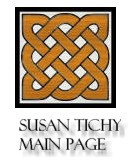ENG
LISH
660:
002
Modernist Women Poets:
Mina Loy, Marianne Moore, Lorine Niedecker
Marianne
Moore: instructor's notes: Susan Tichy
ing
20
05
GEO
RGE
MAS
ON
UNI
VER
SITY
Quotations from Moore's Complete Prose
The staying at home principle could not, he is sure, be a false one where there is vigorous living force with buoyancy of imagination--as there was apparently in Shakespeare--the artist’s excursion being into “perfection” and “technical excellence.”
144 “A Poet of the Quatrocento”, on W.C. Williams, 1927
When an artist is willing that the expressiveness of his work be overlooked by any but those who are interested enough to find it, he has freedom in which to realize without interference, conceptions which he personally values. But advertising, the opposite of such intensiveness, has its uses... The desire to see good things is in itself good when not degraded by inquisitiveness or predatoriness, and it is not just to regard as rapacity the advertiser’s art of educating visualization.
214 Untitled comment, 1929
One would rather disguise than travesty emotion; give away a nice thing than sell it; dismember a garment of rich aesthetic construction than degrade it to the utilitarian offices of the boneyard... One asks a great deal of an author--that he should not be haphazard but considered in his mechanics, that he should not induce you to be interested in what is restrictedly private but that there should be the self-portrait; that he should pierce you to the marrow without revolting you.
328 A comment accompanying three poems by Elizabeth Bishop, 1935
Poetry is an unintelligible unmistakable vernacular like the language of the animals--a system of communication whereby a fox with a turkey too heavy for it to carry, reappears shortly with another fox to share the booty... He [Stevens] shows one how not to call joy satisfaction... Art here is shown to be a thing of proprieties, of mounting “the thickest man on the thickest stallion-back”... Wallace Stevens can be as serious as the starving-times of the first settlers.
331 Review of Wallace Stevens’ Ideas of Order, 1936
Gertrude Stein has a theory that the American has been influenced by the expansiveness of the country and the circumstance that there are great areas of flat land where one sees few birds, flowers, or animals. There are not nightingales, she says, and the eagle is not the characteristic bird it once was; whereas “the mocking-birds ... have spread ... and perhaps they will be all over, the national bird of the United States”--one ambiguous significance which she makes unequivocal.
339 Review of Stein’s The Geographical History of America, 1936
“The problem of art is to discipline emotion without losing it.”
358 Quoting Julien Benda, in a The Dial: A Retrospect, 1940
Art, which “cuts its facets from within” can mitigate suffering, can even be an instrument of happiness; as also forgiveness... With poetry as with homiletics, tentativeness can be more positive than positiveness...
408 Review of Bishop’s North & South, 1946
That which is able to change the heart proves itself.
392 On the dancer Anna Pavlova, 1944
